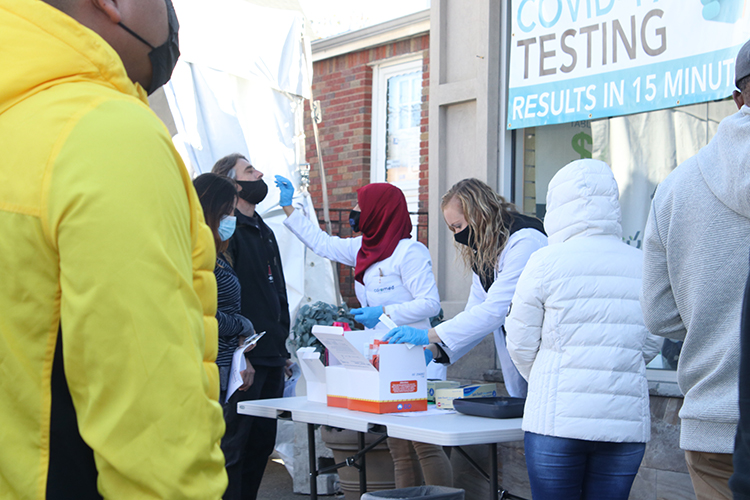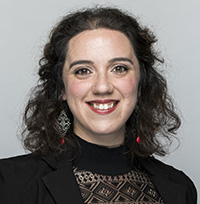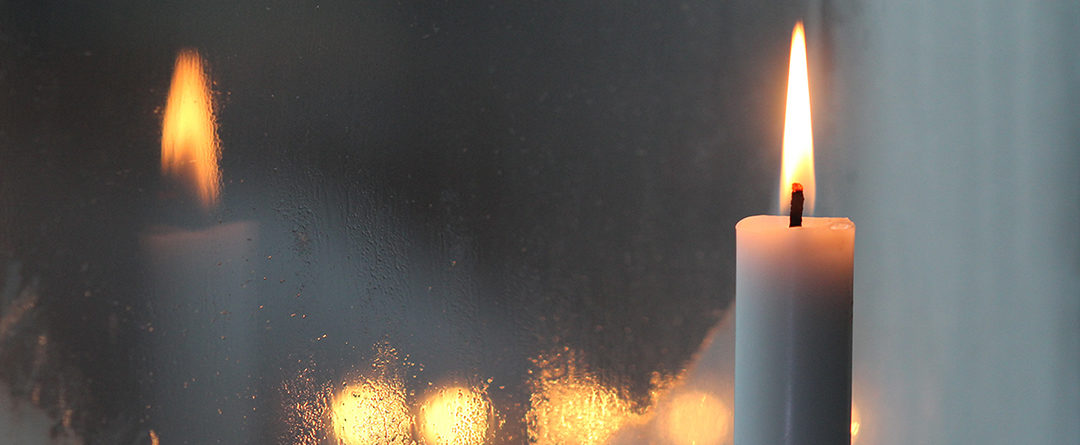by Elyssa J. Salinas-Lazarski
“The Hungry Caterpillar” is one of my 2-year-old’s favorite books. Throughout 12 pages, the caterpillar spends a week eating, growing, and learning before transforming into a beautiful butterfly. I read this with my daughter as we stay inside, awaiting our transformation from pandemic isolation back to a world with hugs, close contact, family functions, and a lot less anxiety.
I feel like I’ve been in a cocoon with my family for months, and while there is a great deal of comfort and privilege in this tight space, it is a place of transition.
We are in Advent, a time of waiting, of watchfulness, of transition. As we await the celebration of the birth of Jesus, our anticipation includes wreaths, candles, solemnity, and even silence. Yet, I find that my most memorable times of waiting and transition were anything but solemn and calm.
 I remember waiting, irritable and stressed, for acceptance or rejection letters into doctoral programs (I received both kinds). I kept refreshing my inbox as if a new email would come in the eight seconds since I last checked. My hands would shake when I would see a school name. And when I got accepted, I screamed. This waiting was tense and heightened, leaving me with a memory of drinking too much coffee.
I remember waiting, irritable and stressed, for acceptance or rejection letters into doctoral programs (I received both kinds). I kept refreshing my inbox as if a new email would come in the eight seconds since I last checked. My hands would shake when I would see a school name. And when I got accepted, I screamed. This waiting was tense and heightened, leaving me with a memory of drinking too much coffee.
I remember waiting for the pregnancy test results I took while home alone with my 11-month-old daughter. I hadn’t felt nauseated. But I did feel faint a couple of times if I waited too long to eat, so I decided to take a test as a precaution. I didn’t plan to be pregnant, as I did with my first.
I paced the kitchen as I listened to my daughter babble in her highchair. My bones felt as if they would jump out of my skin if I tried to sit down. When I checked the test, it registered positive. I cried and promptly tried the other two tests in the box after glugging a bottle of water. My waiting was filled with anxiety and anticipation. And I got the same results.
Waiting to be born
When my son was born, I wore a mask and anxiously waited with my husband in a surgery prep room. My blood pressure was elevated, so doctors moved up my C-section. When I went into the operating room, they gave me an anesthetic to numb me from my belly down to my toes. The plan was for me to be awake during the surgery and birth of my son.
The pain of that anesthetic made me weep uncontrollably. I cried out into the tiled room, sweating. This pain was part of the waiting, the lying on the operating table awake was part of the waiting, and the waiting finally ended when I heard my son’s first cry.
Waiting on the world to change
 When I waited for election results this year, I woke up worried. By the end of breakfast, I was sobbing. I was on the verge of a panic attack, becoming a more regular occurrence during the pandemic. My husband and I decided to escape with the kids to show them Lake Michigan for the first time and have a picnic. Our outing checked all of the 2020s boxes:
When I waited for election results this year, I woke up worried. By the end of breakfast, I was sobbing. I was on the verge of a panic attack, becoming a more regular occurrence during the pandemic. My husband and I decided to escape with the kids to show them Lake Michigan for the first time and have a picnic. Our outing checked all of the 2020s boxes:
socially distant, check
activity to keep the kids busy (and contained), check
doing anything to take my mind off my fears, check.
We packed up our food and our kids, with more than one voice-raising moment at my 2-year-old. Once in the car, my 6-month-old started screaming.
While we were waiting for the election results to come in over the next couple of days, we were also waiting for test results to see if we had COVID. We all had swabs jammed up our noses in an empty MINI Cooper dealership. We stood in line and waited, we got back in our car and waited, we went home and waited, we went to bed and waited.
The entire time my anxiety spiked whenever I felt a tickle in my throat, or one of us sneezed. I felt guilty for passing people on our outing at the lake, even though all parties were masked and distancing. I kept bursting into tears or yelling at our cats for little things that would set me off. I needed noise to fill all silences, or else I would be alone with my thoughts.
I was waiting, and I was terrified.
When the election was called, that waiting ended. We received a text message with our COVID results, and all of us tested negative. We hugged. We cried. We called our close family and friends who had been waiting with us.
This year has given us all pause: Waiting for election results, a vaccine, a safe way to be together—and now for the story of Christ.
I can’t imagine the night of Christ’s birth was silent. It involved the pain of contractions and the cries of a young Mary. Birth is transformational. It turns a person into a parent and a body into a cocoon. What emerges is more than a child; it is hope.
Waiting is painful and scary and hopeful and beautiful. There is deep pain when waiting for something truly transformational. When we are transformed, it is from something that changes our world and shakes us to the core. And sometimes, that change takes time.
Discussion Questions:
1. What does waiting mean for you in the time of Advent?
2. How does waiting affect you?
3. What does transformation mean to you?
4. How can you cultivate hope in a time of extended uncertainty?
Closing Prayer:
God of transformation, stay with us in our waiting, our watchfulness, and our hope. We wait for your coming in this time of Advent. We pray that the waiting makes us more compassionate to the world around us. Fill our watchful hearts with peace and our actions with kindness. In your name we pray, amen.

Elyssa is a doctoral student in theology at Garrett-Evangelical Theological Seminary. She focuses on theology of the body and sex. Alongside her studies, she is a poet and hobby baker. As a writer, Elyssa’s poetry and blogging can be found at Boldcafé, The Mudroom, Naked and Unashamed, and We Talk, We Listen. She lives in Chicago with her husband, two children, and two cats.


Waiting in Advent reminds me that waiting–i.e. expectancy–is a healthy condition for all of life. Expectancy, that’s a positive term. Waiting from a perspective of wonder/awe at the universe, including loving relationships, story.
Living through the pandemic is teaching me to be a better waiter. I am surprised that this synonym for “servant” pops into my thoughts.
Servanthood is part of that ,culturally, upside-down call to live and act incarnationally.